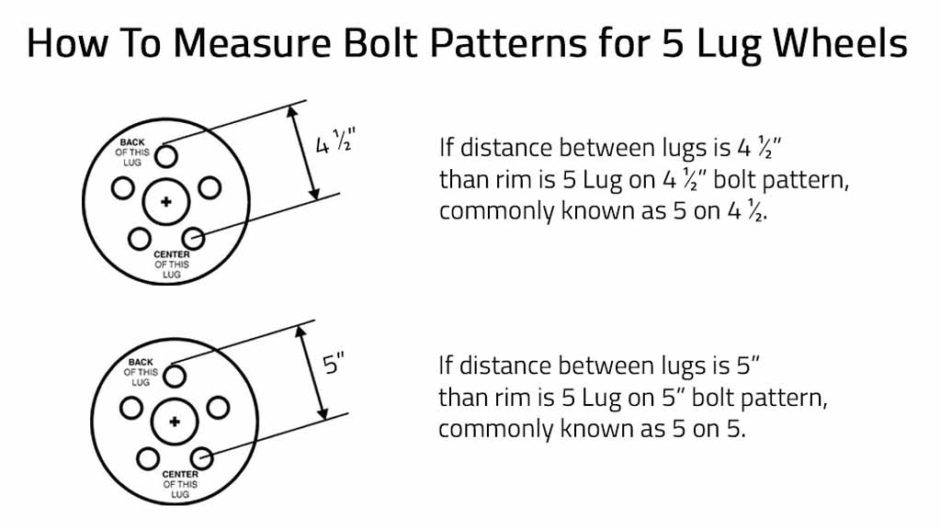Mastering Trailer Wheel Bolt Pattern Measurement

Ensuring your trailer wheels are properly fitted is crucial for safe and efficient towing. A critical aspect of this is understanding your trailer's wheel bolt pattern. Incorrectly matched wheels can lead to dangerous situations, including wheel detachment. This comprehensive guide will equip you with the knowledge to confidently measure your trailer wheel bolt pattern.
A wheel bolt pattern, also known as a lug pattern or PCD (Pitch Circle Diameter), is the arrangement of the mounting holes on a wheel hub. It's defined by the number of lug holes and the diameter of the circle that passes through the center of these holes. Knowing this pattern is essential when replacing wheels or tires. Imagine the frustration of purchasing new wheels only to discover they won't fit your trailer!
The standardization of wheel bolt patterns emerged with the rise of the automobile industry. Early vehicles often had bespoke wheel designs, making replacements difficult. As mass production became the norm, standardized bolt patterns simplified manufacturing and maintenance, ensuring interchangeability between different vehicle and wheel manufacturers. Today, numerous bolt patterns exist, varying based on the vehicle type and manufacturer.
Accurately determining the bolt pattern is paramount for safety and performance. An incorrect match can cause wheel wobble, premature tire wear, and even wheel failure. This can lead to loss of control, property damage, and potentially serious injury. Therefore, precise measurement is non-negotiable.
Failing to correctly measure your trailer wheel bolt pattern can result in several problems. Loose wheels can cause vibration and handling issues, while improper fitment can stress the wheel studs, leading to breakage. Moreover, an incorrect bolt pattern can void warranties and create liability issues in the event of an accident.
Understanding the terminology involved is helpful. The "lug" refers to the bolt that fastens the wheel to the hub. The "pitch circle diameter" is the imaginary circle that passes through the center of all the lug holes. Determining these two factors defines your bolt pattern.
For instance, a common trailer bolt pattern is 5 on 4.5 inches. This means the wheel has five lug holes, and the diameter of the circle connecting the center of those holes is 4.5 inches. Another example is a 6 on 5.5-inch pattern, signifying six lug holes with a 5.5-inch pitch circle diameter.
Knowing your trailer's bolt pattern offers several advantages. First, it allows you to purchase the correct replacement wheels and tires, saving you time and potential returns. Second, it ensures a safe and stable towing experience. Third, it protects your investment by preventing damage caused by ill-fitting wheels.
To determine your bolt pattern, you'll need a ruler or tape measure. For wheels with an even number of lugs, measure from the center of one lug hole directly across to the center of the opposite lug hole. This gives you the diameter. For odd numbers of lugs, measure from the back edge of one lug hole to the center of the opposite lug hole, then multiply by 1.701 to get the diameter. Count the number of lugs and you have your complete bolt pattern.
Best Practices: Always double-check your measurements. Consult your trailer's owner's manual or contact the manufacturer for confirmation if unsure. Use a digital caliper for more accurate measurements. Clean the hub face before measuring to ensure accurate readings. Never assume the bolt pattern based on visually similar wheels.
Advantages and Disadvantages of Accurate Bolt Pattern Measurement
| Advantages | Disadvantages |
|---|---|
| Ensures safety | Requires some effort and time |
| Prevents damage to the trailer | Can be challenging on rusted or damaged hubs |
| Saves time and money |
FAQs
Q: What if I can't find my owner's manual? A: Contact the trailer manufacturer or a reputable trailer dealer.
Q: Can I use wheels with a different bolt pattern? A: No, never use wheels with an incorrect bolt pattern.
In conclusion, accurately measuring your trailer wheel bolt pattern is a fundamental aspect of trailer maintenance. It guarantees safe towing, prevents costly repairs, and protects your investment. By following the steps outlined in this guide, you can confidently identify your bolt pattern and ensure your trailer is equipped with the correct wheels. Take the time to measure accurately – your safety and peace of mind are worth it. Don't risk compromising your trailer's stability and your safety. Measure your bolt pattern correctly today!
Understanding onlyfans tv a comprehensive guide
Unlocking the secrets of benjamin moore shadow gray
Automatic transmission troubles when your car wont shift













